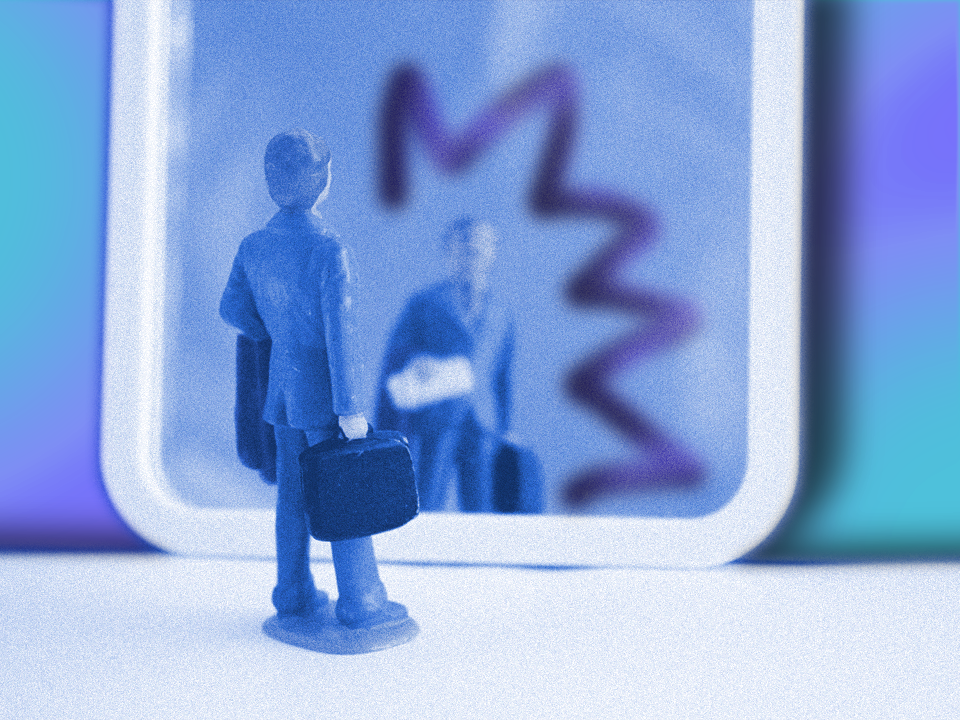Surprise! Your Ex Probably Isn’t a Narcissist
I don’t know who needs to hear this, but it might be all of us.
You might’ve heard, but the internet has a new nemesis: The Narcissist. Between TikTokers sharing what it’s like to date one to non-experts explaining how to spot one, you’re not alone if you’re suddenly wondering whether your shitty ex or the people who raised you qualify as full-on narcissists. And while it sucks to spend time with someone who’s more interested in themself than anyone else or thinks “I’m sorry you feel that way” is an apology, those personality traits don’t necessarily make them a narcissist. To be honest, it’s way more complicated than that. So what is a narcissist? Here’s everything you need to know.
What is narcissism anyway?
Narcissism itself is not a mental health disorder. Instead it refers to a nice lil bouquet of personality traits that includes arrogance, entitlement, and craving adoration. Someone who’s being narcissistic also doesn’t usually express admiration or empathy for others, says University of Georgia psychology professor and clinical program chair Josh Miller, PhD, who studies narcissism.
In case you were wondering, there is a big difference between confidence and narcissism. For example, at work, a person who’s feeling great about themself might know that they’re good at managing a team, meeting deadlines, and having a positive attitude. At the same time, they know that other employees are also as talented and hardworking as them. But if someone is being narcissistic, they think they’re the only one who can do what they do and that they deserve special treatment because of it, says Dr. Miller.
Like extraversion and other personality traits, narcissism exists on a spectrum, so some people are almost never narcissistic, some act narcissistic most of the time, and some fall in between, says Dr. Miller. So, yes, it’s totally possible that your ex was on this spectrum, but that still doesn’t make them “a narcissist.”
So then what is a narcissist?
If someone falls on the extreme end of the narcissism spectrum and it’s been part of their personality for a while, they might be diagnosed with a mental health condition called narcissistic personality disorder (NPD). Some research suggests that about 1% of people have NPD, which might make you ponder just how many people who claim they dated a narcissist actually did. Just saying!
In order to qualify for an NPD diagnosis, they’d need to meet at least five out of nine criteria in the Diagnostic and Statistical Manual of Mental Disorders (DSM-5-TR), like showing arrogance; being fixated on power, beauty, or success; needing praise from others; having an excessive sense of self-importance; lacking empathy; and taking advantage of other people for their own gain. Those symptoms have to interfere with their functioning or relationships (which is bound to happen when someone consistently puts their own needs before others’). Also, we’re talking about a pervasive pattern of behavior here, not just exhibiting a handful of those symptoms once or twice.
While you could technically call someone who’s diagnosed with NPD a “narcissist,” it might be more accurate (and less rude, TBH) to say “a person with NPD,” says clinical psychologist Mark Ettensohn, PsyD, who specializes in treating people with narcissism issues.
In real life, you might notice that a person with NPD regularly puts their own needs, wants, and desires above other people’s, says Dr. Miller. It’s not just about one convo where they don’t want to talk about your day. That sucks, but it doesn’t necessarily mean they have NPD.
Also, because narcissistic people feel like they need to be special and crave validation from others, they can stop talking to or hold a grudge against coworkers, partners, or friends who don’t give that to them, says Dr. Ettensohn. People with NPD might also insult those who they feel aren’t cool or beautiful because of their own insecurities (yeah, kinda like a bully), he says.
People with NPD can get angry when you criticize them too. Say you tell a narcissistic person that they used the wrong “we’re” in a text. They might get mad because it brings up their insecurities about not being perfect or because it challenges what they believe—that they’re flawless, says Dr. Miller.
Of course, not everyone who reacts badly to criticism, is overly confident, or puts others down has NPD. But a pattern of this kind of behavior that totally disregards your feelings could be a sign that they fall somewhere on the narcissism scale.
What causes narcissism?
Though it’s only mentioned briefly in the DSM-5-TR, it’s possible that deep insecurities could play a role in NPD. Dr. Ettensohn believes that many who are highly narcissistic, whether they have NPD or not, are dealing with lots of insecurity—even if they seem arrogant and entitled.
For example, while some highly narcissistic people want all eyes on them at a party, others might avoid the party altogether. That’s because, even though they want to be noticed, they could feel like they’ll never live up to the expectations they put on themselves to be the center of attention, Dr. Ettensohn says. This can make them feel worthless and cause feelings of depression, he adds.
One theory suggests that people who are highly narcissistic have low self-esteem because the people who raised them didn’t appreciate them or empathize with them growing up, so they put up a front that can come off as self-centered, which seems logical. But, FWIW, Dr. Miller doesn’t believe that all narcissists have an insecure side to them since the data, in his opinion, isn’t strong enough to support that.
Plus, there’s another theory that argues that some narcissistic people whose parents gave them unrealistic praise actually do believe they’re the best and deserve special treatment, says Dr. Miller. That would be kind of like Dudley Dursley and his parents in Harry Potter, if you know what I mean. Basically, the narcissism origin story is still pretty murky.
How is narcissism treated?
Because most people with NPD or who have narcissistic traits usually don’t see any issue with their behavior or thoughts, it can be hard to treat this mental health issue, says Dr. Ettensohn. In his experience, people with NPD often come in for therapy when their narcissism causes problems in their life and when they feel lost, confused, or depressed.
There’s not a ton of research out there about effective NPD treatments, says Dr. Miller. But talk therapy, like cognitive behavioral therapy (CBT), can help people with NPD challenge their narcissistic thoughts. Those therapies can also benefit people who don’t meet the criteria for NPD but struggle to manage those narcissistic tendencies, says Dr. Miller. Dialectical behavior therapy (DBT) can help people with NPD or narcissistic traits who have a hard time managing emotions like anger, says Dr. Ettensohn.
Overall, therapy for NPD or narcissistic issues will challenge a person’s sense of entitlement, helping them learn to tolerate their and other people’s imperfections without acting out, while also acknowledging their flaws, says Dr. Ettensohn.
Helping people with NPD build self-compassion is important too. Yeah, it definitely sounds strange considering most people with NPD appear to be self-love legends, but that’s not always the case. In order for them to feel and show compassion for other people, they need to know what it feels like to show it to themselves, Dr. Ettensohn explains.
The bottom line: So, is your ex actually a narcissist? Maybe! But NPD isn’t really that common, and it’s not as straightforward as you might think. In the end, they might just suck as a partner, and you don’t need a mental health expert to diagnose that.
Wondermind does not provide medical advice, diagnosis, or treatment. Any information published on this website or by this brand is not intended as a replacement for medical advice. Always consult a qualified health or mental health professional with any questions or concerns about your mental health.




